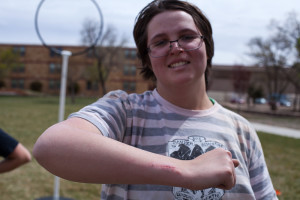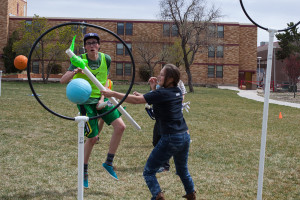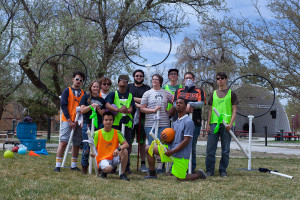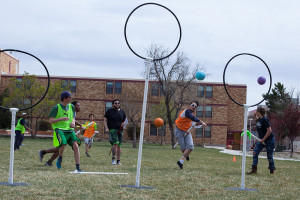Tags
Related Posts
Share This
Quidditch on the Quad
“It’s a perfect day for quidditch,” Charlotte Renken says, sitting on The Quad. Using a pump, she inflates a dodge ball that will serve as one of the bludgers in today’s game. Renken wears the official jersey of the Denver Dementors, her former quidditch team in Colorado. On the front of the shirt, three cloaked figures manipulate a quidditch player like a marionette. The back is graced with the number 9 ¾. She grasps the dodge ball in her hand. “You don’t want to fill them up all the way. They need to be a little deflated so they’re easier to grab.”
Riley Gardner pulls PVC pipes from a large, blue storage container. Some of the pipes will be used as goal posts and the others take the place of broomsticks. In the Harry Potter books, quidditch players fly on broomsticks. In the real world, quidditch played by non-magical beings is sometimes referred to as muggle quidditch. As Renken and Gardner prepare the equipment for SFUAD’s first quidditch practice April 12, the 2015 Quidditch World Cup takes place in Rock Hill, South Carolina. The sport began at Middlebury College in Vermont in 2005. Under the banner of the International Quidditch Association, the first Quidditch World Cup was held at Middlebury College in 2007.
“The game appeals to so many people,” Gardner says. “I don’t think J. K. Rowling ever envisioned this.”
SFUAD’s quidditch team began as Gardner’s brainchild. He ordered most of the equipment over the summer of 2014, and signed up more than 70 potential members at two separate club fairs. As a member of student government, Gardner says that one of the goals of Student Life is to have more activity on The Quad. “People spend a lot of time holed up in their rooms. We don’t have any other sports at the school and this is something fun do to when nothing else is happening on the weekend,” Gardner says.
Renken joined Gardner as a group founder in the fall. After playing for the Denver Dementors, her interested in keeping fit increased. “I was a total couch potato,” she says. “I couldn’t find a sport I liked. For Harry Potter fans, quidditch is a way to get into playing sports. I just ignored the physicality because I was too busy thinking, I’m playing quidditch! Oh, my God!”
Meg Colburn is the third group founder, who Gardner says has been instrumental in getting the word out about the team. Colburn joins Renken and Gardner on The Quad, fresh from her work on SFUAD’s production of String of Pearls. “I asked my director if I could leave early for quidditch practice,’” Colburn says. “I feel like I just reached one of my life’s goals.”
Gardner inserts PVC pipes of varying sizes into black bases, then uses tee pipes to connect rubber hoops to the tops of the goal posts. He places three hoops on each side of the playing field (or the “pitch”). Renken paces between the goal posts, ensuring they are placed the length of one broomstick apart from each other. Students wander by every few minutes, asking when the game will begin. No one knows how many players to expect for the game. “There are supposed to be seven players on a team, but I’ve played with as few as three,” Renken says.
A full quidditch team consists of three chasers, two beaters, a keeper and a seeker. The chasers chase after the quaffle, which, for the purposes of muggle quidditch, is an under-inflated volleyball. The beaters attempt to knock the chasers off of their broomsticks using bludgers. “Usually, the beater succeeds,” Renken says.
If the beater hits a chaser, the chaser must circle back to the end of the pitch and touch the goal posts before returning to game play. The goal posts are guarded by the keeper. When a chaser throws the quaffle through one of the hoops, their team scores ten points. Meanwhile, the seeker tries to catch the snitch. Unlike in the books, the snitch is a human rather than a golden, winged ball. Austin Ross volunteers to play the snitch. He wears bright, yellow shorts to stand out from the other players. Renken tucks an orange sock stuffed with a tennis ball into Ross’ waistband.
“My plan is to run really fast and juke people,” Ross says. He demonstrates “juking,” moving left and right, back and forth. Ross learned this technique in his years playing football. He says it psyches the opponent out as to which way he will run. The snitch can run anywhere inside or outside of the pitch. The seekers must pull the sock from the snitch’s waistband in order to score. Once the seeker catches the snitch, the game ends.
In the world of Harry Potter, the golden snitch is worth 150 points. In muggle quidditch, the snitch is worth only 30 points. Since game play ends with the capture of the snitch, seekers must wait until their team is in a position to win before capturing the golden prize. “You could lose or tie if you catch the snitch too soon,” Renken says.
The game draws Harry Potter fans and athletes alike. “I’m a Slytherin and I’m here to play,” says Josh Henry-Biskup, pulling a drag from his cigarette. A T-shirt bearing the words, “Slytherin Team Captain,” drapes his lanky frame. He says he has never played real-world quidditch.
Serafima Federova, watching from the sidelines, decides to join the game. Two more players arrive and Renken begins drills. “The drills are a good way to see what position you’re good at,” she says.
Players practice catching the quaffle and tossing it through the hoops. Most of them agree that it’s hard to pass a ball while holding a broomstick between your legs. Ross tosses the quaffle through a hoop like he’s dunking a basketball. Angel Urquidi, on an actual broom, follows suit. Spectators gather along the sidewalk. Asked if he plans to play, Alex Addison says he is just here to watch, but “if I could fly, I’d play every day.”
Charles Simon passes by with a guitar case slung across his back. He hands the guitar to Addison and runs to the pitch, grabbing a broom. Federova passes the quaffle to Simon and he throws it through the hoop. With the drills complete, Renken hands out jerseys for gameplay. The players tie colored bandanas around their PVC brooms, indicating their team positions. At the start of the first game, 12 players populate the pitch.
Players step in and out from one game to the next. Gardner twists his ankle, but Renken manages to get through with only a scrape. After three games, the group agrees to meet later to play some more. At 6 p.m., the players convene again on The Quad. Nearby, students fly drones high above the Astroturf. Music blasts from the dorm windows of Kennedy Hall. Gardner keeps his ankle raised as he sits on the sidelines and acts as commentator for the evening’s games.
The players take to their knees at the start of the match, their heads down and eyes closed. “The snitch is released,” Renken says. “Brooms up!”
Meg Colburn plays the keeper. Her team scores two times in a row.
“That’s another point for the team not wearing jerseys,” Gardner shouts. “I think we need team names. Meg, think of a name for your team.”
“We’re the…” She thinks for a moment. “Daring Dementors.”
“Ew,” Gardner says. “Can you come up with something better than that?”
Colburn’s opponent, a towering behemoth, lobs the quaffle over her head, tying the game. “We’re the Thriving Thestrals,” Colburn decides, in reference to the skeletal horses of the Harry Potter books.
For the next game, Colburn volunteers to play the snitch. Rufino Medrano steps in to play the keeper. “Explain the rules to him,” Renken shouts.
“Keep the ball from going in the holes,” Colburn says.

Quidditch can be rough sometimes, as muggle Charlotte Renken experienced during the match. Photo by René Bjorheim
The players kneel again while Colburn runs off to hide. The game begins and it doesn’t take long for seeker Aaron Campos to discover Colburn. He catches up to her. “I hate this so much,” Colburn says, cornered by Campos. “Can we talk about this?”
The opposing team’s seeker falls on the Astroturf, scraping her knee. Spectators line the sidewalk. Campos snatches the snitch and the game comes to a close. “Being the snitch sucks balls,” Colburn says, returning to the pitch.
As Charles Simon jukes a beater and tosses the quaffle through the hoop, Colburn checks the results of the Quidditch World Cup. The University of Texas has won again, for the third straight year in a row. The sun dips beneath the horizon, painting the sky in orange and purple. The group decides to play one more match before it gets too dark to play. David DeVillier and quidditch club sponsor, Terrance Sanders, approach The Quad. Gardner recalls that Sanders was skeptical about student interest in the game. Sanders admits that he may have been wrong. Students interested in playing can stay up to date on future practices with the Facebook group, “Quidditch on The Quad.”









 Jackalope Magazine is the student magazine of Santa Fe University of Art and Design. Building on the interdisciplinary nature of our education, we aim to showcase the talent of our university and character of our city.
Jackalope Magazine is the student magazine of Santa Fe University of Art and Design. Building on the interdisciplinary nature of our education, we aim to showcase the talent of our university and character of our city.
Recent Comments